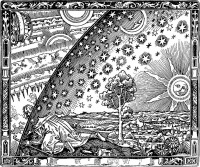Cosmos
From The Art and Popular Culture Encyclopedia
| Revision as of 19:16, 19 May 2014 Jahsonic (Talk | contribs) ← Previous diff |
Current revision Jahsonic (Talk | contribs) (→See also) |
||
| Line 3: | Line 3: | ||
| <hr> | <hr> | ||
| <small> | <small> | ||
| - | "Before the [[ocean]] and the [[earth]] appeared— before the skies had overspread them all— the face of [[Nature]] in a vast expanse was naught but [[Chaos]] uniformly waste. It was a rude and undeveloped [[mass]], that nothing made except a ponderous weight; and all discordant elements confused, were there congested in a [[shapeless]] heap." -- [[Metamorphoses (Brookes More translation)]]) | + | "Before the [[ocean]] and the [[earth]] appeared— before the skies had overspread them all— the face of [[Nature]] in a vast expanse was naught but [[Chaos]] uniformly waste. It was a rude and undeveloped [[mass]], that nothing made except a ponderous weight; and all discordant elements confused, were there congested in a [[shapeless]] heap." -- [[Metamorphoses (Brookes More translation)]] |
| </small>]] | </small>]] | ||
| {{Template}} | {{Template}} | ||
| Line 31: | Line 31: | ||
| * [[Cosmic]] | * [[Cosmic]] | ||
| * [[Cosmology]] | * [[Cosmology]] | ||
| + | *[[Cosmological argument]] | ||
| * [[Cosmography]] | * [[Cosmography]] | ||
| * [[Fate of the universe]] | * [[Fate of the universe]] | ||
Current revision


"Before the ocean and the earth appeared— before the skies had overspread them all— the face of Nature in a vast expanse was naught but Chaos uniformly waste. It was a rude and undeveloped mass, that nothing made except a ponderous weight; and all discordant elements confused, were there congested in a shapeless heap." -- Metamorphoses (Brookes More translation)
|
Related e |
|
Featured: |
Cosmos is the Universe regarded as a beautifully-arranged system.
Pythagoras is said to have been the first philosopher to apply the term "cosmos" (Greek κόσμος) to the Universe, perhaps referring to the starry firmament. The Ancient Greek natural philosopher Archimedes, in his essay "The Sand Reckoner," estimated the diameter of the cosmos.
Contents |
Etymology
The word derives from the Greek term κόσμος (kosmos), literally meaning "well-ordered" or "ornament" and metaphorically "world," and is antithetical to the concept of chaos in its ugly state. Today, the word is generally used as a synonym of the Latin loanword "Universe" (considered in its beautifully-ordered aspect). The word cosmetics originates from the same root. In many Slavic languages the word kosmos (космос) also means "outer space."
Cosmology
Cosmology is the study of the cosmos in several of the above meanings, depending on context. All cosmologies have in common an attempt to understand the implicit order and beauty within the whole of being. In this way, most religions and philosophical systems have a cosmology.
In physical cosmology, the term cosmos is often used in a technical way, referring to a particular spacetime continuum within the (postulated) multiverse. Our particular cosmos, the observable universe, is generally capitalized as the Cosmos.
Theology
In theology, the term can be used to denote the created Universe, not including the creator. In Christian theology, the word is also used synonymously with aion to refer to "worldly life" or "this world" as opposed to the afterlife or World to Come. The cosmos as originated by Pythagoras is parallel to the Zoroastrian term aša, the concept of a divine arrangement, or divinely fashioned creation.
See also
- Anthropic principle
- Astronomy
- Cosmic
- Cosmology
- Cosmological argument
- Cosmography
- Fate of the universe
- Macrocosm and microcosm
- Megaverse
- Multiverse
- Observable universe
- Order
- Omega point (de Chardin)
- Omniverse
- Soter Kosmoi
- Timeline of the Big Bang

